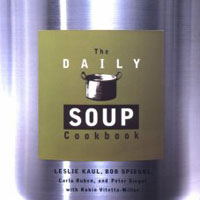Winter Minestrone

Ingredients
- 2 Tbs olive oil
- 1 large Spanish onion, chopped
- 2 garlic cloves, minced
- 1/2 head cabbage, preferably Savoy, chopped
- 2 tsp dried thyme leaves
- 1 bunch fresh basil stems (leaves removed), tied together with string
- 1 1/2 tsp kosher salt
- 1/2 tsp ground black pepper
- 8 cups basic vegetable stock
- 1 butternut squash (about 1 1/2 pounds), peeled, seeded, and cut into 1-inch cubes
- 4 red potatoes, cut into 1inch cubes
- 3 Tbs tomato paste
- 1 (3-inch) piece Parmesan cheese rind
- 2 cups uncooked spinach radiatore pasta, or any spiral pasta
- 1 cup prepared basil pesto
- 1/2 cup chopped scallions
Directions
- Heat the oil in a large stockpot over medium heat. Add the onion and garlic and sweat for 4 minutes, until tender.
- Add the cabbage and sweat for 4 minutes, until wilted.
- Add the thyme, basil stems, salt, and pepper and stir to coat the vegetables. Add the stock, squash, potatoes, tomato paste, and Parmesan rind and bring the mixture to a boil. Reduce heat, partially cover, and simmer for 10 minutes.
- Add the pasta and cook for 10 minutes, until tender.
- To serve, remove the basil stems and Parmesan rind, ladle the soup into bowls, and top with a dollop of pesto and the chopped scallions.
Nutrition Facts
Copyright © 2024 TraceGains, Inc. All rights reserved.
Read our healthy recipe definitions.
Learn more about TraceGains, the company.
The information presented here is for informational purposes only and was created by a team of US–registered dietitians and food experts. Consult your doctor, practitioner, and/or pharmacist for any health problem and before using any supplements, making dietary changes, or before making any changes in prescribed medications. Information expires December 2024.



 We are proud to announce that
We are proud to announce that  As the market evolves, customers increasingly request a wider variety of omega-3 options for their lipid...
As the market evolves, customers increasingly request a wider variety of omega-3 options for their lipid...  Maintaining healthy glucose levels is crucial for preventing metabolic conditions like diabetes,...
Maintaining healthy glucose levels is crucial for preventing metabolic conditions like diabetes,...  Looking at formulating a new vitamin blend? Discover
Looking at formulating a new vitamin blend? Discover 







































